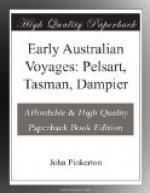have attempted heretofore, or even now, the establishing
colonies in those countries, would be impolitic, because
it would be grasping more than the East India Company,
or than even the republic of Holland, could manage;
for, in the first place, to reduce a continent between
three and four thousand miles broad is a prodigious
undertaking, and to settle it by degrees would be
to open to all the world the importance of that country
which, for anything we can tell, may be much superior
to any country yet known: the only choice, therefore,
that the Dutch had left, was to reserve this mighty
discovery till the season arrived, in which they should
be either obliged by necessity or invited by occasion
to make use of it; but though this country be reserved,
it is no longer either unknown or neglected by the
Dutch, which is a point of very great consequence.
To the other nations of Europe, the southern continent
is a chimera, a thing in the clouds, or at least a
country about which there are a thousand doubts and
suspicions, so that to talk of discovering or settling
it must be regarded as an idle and empty project:
but, with respect to them, it is a thing perfectly
well known; its extent, its boundaries, its situation,
the genius of its several nations, and the commodities
of which they are possessed, are absolutely within
their cognisance, so that they are at liberty to take
such measures as appear to them best, for securing
the eventual possession of this country, whenever
they think fit. This account explains at once
all the mysteries which the best writers upon this
subject have found in the Dutch proceedings.
It shows why they have been at so much pains to obtain
a clear and distinct survey of these distant countries;
why they have hitherto forborne settling, and why they
take so much pains to prevent other nations from coming
at a distinct knowledge of them: and I may add
to this another particular, which is that it accounts
for their permitting the natives of Amboyna, who are
their subjects, to carry on a trade to New Guinea,
and the adjacent countries, since, by this very method,
it is apparent that they gain daily fresh intelligence
as to the product and commodities of those countries.
Having thus explained the consequence of Captain Tasman’s
voyage, and thereby fully justified my giving it a
place in this part of my work, I am now at liberty
to pursue the reflections with which I promised to
close this section, and the history of circumnavigators,
and in doing which, I shall endeavour to make the
reader sensible of the advantages that arise from
publishing these voyages in their proper order, so
as to show what is, and what is yet to be discovered
of the globe on which we live.
CHAPTER XXI: REMARKS UPON THE VOYAGE.
In speaking of the consequences of Captain Tasman’s voyage, it has been very amply shown that this part of Terra Australis, or southern country, has been fully and certainly discovered. To prevent, however, the reader’s making any mistake, I will take this opportunity of laying before him some remarks on the whole southern hemisphere, which will enable him immediately to comprehend all that I have afterwards to say on this subject.




